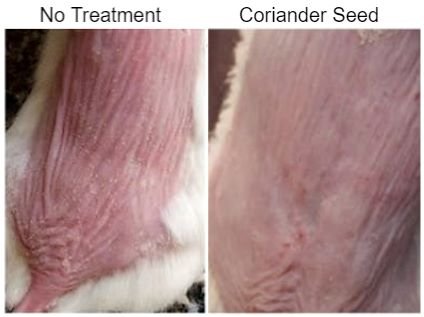
Essential oils, including popular ones like lavender and tea tree oil, are commonly found in various skincare products.
However, are essential oils on skin friend of foe?
It’s important to be aware that these ingredients can sometimes lead to skin irritation and potential long term damage, especially if applied at a high concentration or purchasing from a company/person who is not familiar with proper scientific formulation
Essential oils are volatile plant extracts known for their distinctive and pleasant aromas.
They can be derived from different parts of a plant, including flowers, bark, stems, leaves, roots and even fruits.
Regardless of their source, these oils consist of complex blends containing around 60 different components — some beneficial for the skin while others not as favorable.
The fragrant compounds present in essential oils are what pose potential issues when used on the skin; however, they can also have multiple benefits.
This duality often confuses people because although these oils provide delightful scents, what may be pleasing to your nose may not necessarily be beneficial for your skin if used at a high concentration or from a company that doesn’t understand the science behind it
Many companies that sell products containing these oils often boast about their use in aromatherapy for centuries.
However, modern science has uncovered the truth about how certain oils can actually cause skin issues. It’s unfortunate, but the reality is you must purchase your skincare products that contains essential oils from a company that knows how to properly formulate these ingredients.
Is it safe to apply essential oils on skin?
Skincare products often include diluted essential oils with claims of fighting breakouts and reducing fine lines and wrinkles.
While you can certainly apply diluted essential oils to your skin, there are some reasons not to do and some reasons they are very beneficial.
The only exception is when using essential oils specifically for aromatherapy, where small amounts are applied strategically to allow inhalation during the process.
So Are essential oils on skin harmful?
Some components found in essential oils do offer benefits for the skin. For instance, many of them contain powerful antioxidants like caffeic acid and rosmarinic acid, among others.
Additionally, some have powerful antibacterial properties that protect against visible skin problems caused by fungi, yeast and other topical issues.
Sounds promising, right? Well, Yes and no
In general, some essential oils are not recommended for skin health due to their potential to irritate and damage the skin.
Many of these oils contain compounds that can cause reactions like contact dermatitis, dryness, redness and itching.
Common irritants found in essential oils include fragrance ingredients such as limonene, citronellol, eugenol and linalool, which are present in various fragrant plant oils.
These irritants are generally fine at low levels (if formulated properly) but some products on the market contain high levels of these irritants.
While certain essential oils like rosemary, lemongrass, thyme, cinnamon, citronella and tea tree have shown some helpful properties for acne prone skin through research studies, they can also cause significant irritation at high levels.
When it comes to addressing aging skin concerns such as wrinkles, brown spots, loss of firmness or exfoliation needs—essential oils are ‘not always’ a good solution, especially if the company you are purchasing from doesn’t know proper skincare science (and we have seen a lot of them lately)
Now the good news;
If the company does know it’s science and how to formulate properly, There have been many recent studies showing that essential oils on skin (when formulated correctly) are extremely safe, effective and beneficial for the skin:
The Science
Safety:
A 2022 study* published in the International journey of cosmetic science showed using in vitro, ex vivo and clinical studies that a diluted combination of common essential oils (Tea tree, lavender, eucalyptus) were considered non-cytotoxic or non-phototoxic separately.
Finally, the essential oils in combination in an appropriate amount were safe and effective in the improvement of the hydrolipidic balance (your skin barrier function) and morphological properties (the skins structure and appearance)
Anti-aging:
A study* conducted in 2022 found that mice who had their skin prematurely aged by UV light had significantly less wrinkles, roughness and signs of premature aging in the Coriander seed essential oil treated group
They also found that the essential oil had significant anti-elastase, anti-collagenase, anti-tyrosinase and anti-hyaluronidase activities (so it helped block the enzymes that break down the collagen, elastin and hydration in the skin)

Skin Damage/Scars/healing:
A 2021 study* found Helichrysum essential oil to provide significant wound repairing effects compared to the no treatment group

Another 2021 study* used an essential oil blend on old hypertrophic scarring (thick, raised scar tissue) and found a dramatic reduction in the appearance and thickness of the skin damage:

Skin protection:
A study* carried out in Australia found that the Indian Sandalwood essential oil showed outstanding skin protection against environmental stresses that can cause premature ageing

…And this is just a few, you can find hundreds more on their antibacterial, anti-viral and anti-inflammatory properties
So should you stay clear of essential oils in skincare?
The answers is; It depends.
Essential oils can provide a whole host of benefits for the skin but you need to get them from a company that knows how to formulate for effectiveness while keeping the irritant levels extremely low.
Some excellent products we recommend that have been formulated by experts are:
SD7 Lipid Serum (Anti-aging serum)
Scarderma Pro (for scars and skin damage)
Products and essential oils to avoid:
First of all, NEVER use ANY neat or undiluted essential oils on your skin:
Also try to avoid skincare products that contain high levels of essential oil, if it smells really strong, it has probably been formulated incorrectly… so it’s best to avoid it completely…. especially if the fragrance is a strong mint or citrus smell (unless it’s a wash off product like a shower gel or shampoo)
Certain mint oils, like peppermint, wintergreen, pennyroyal and balm mint, may have a cooling effect but can actually irritate the skin and cause damage if formulated incorrectly. Similarly, it’s best to avoid camphor oil since it can be quite irritating.
Quoted Studies:
- Safety and efficacy of combined essential oils for the skin barrier properties: In vitro, ex vivo and clinical studies – PubMed (nih.gov)
- Coriander (Coriandrum sativum L.) essential oil and oil-loaded nano-formulations as an anti-aging potentiality via TGFβ/SMAD pathway
- Formulation and Evaluation of Helichrysum italicum Essential Oil-Based Topical Formulations for Wound Healing in Diabetic Rats
- Antioxidant and Anti-Aging Potential of Indian Sandalwood Oil against Environmental Stressors In Vitro and Ex Vivo

